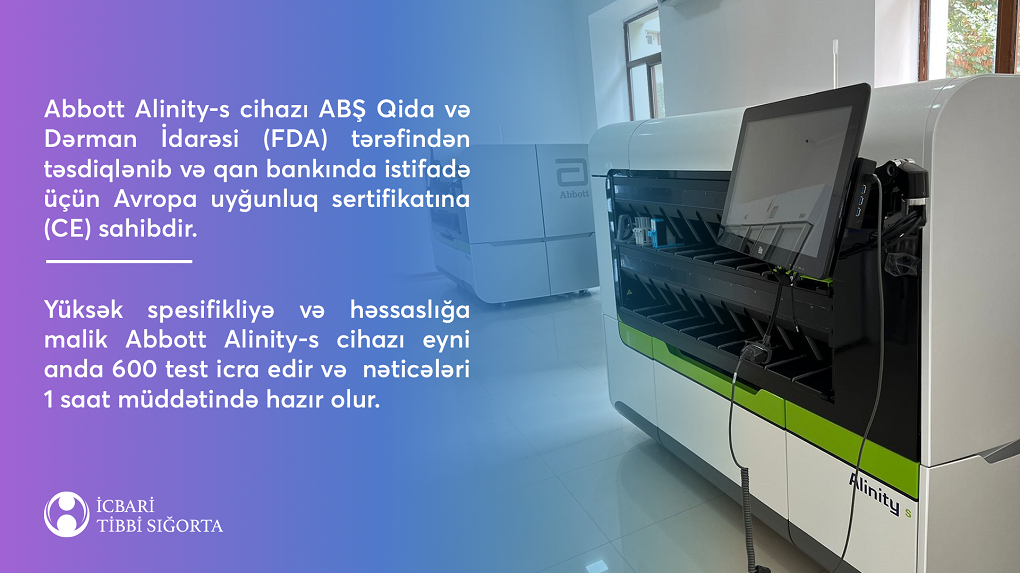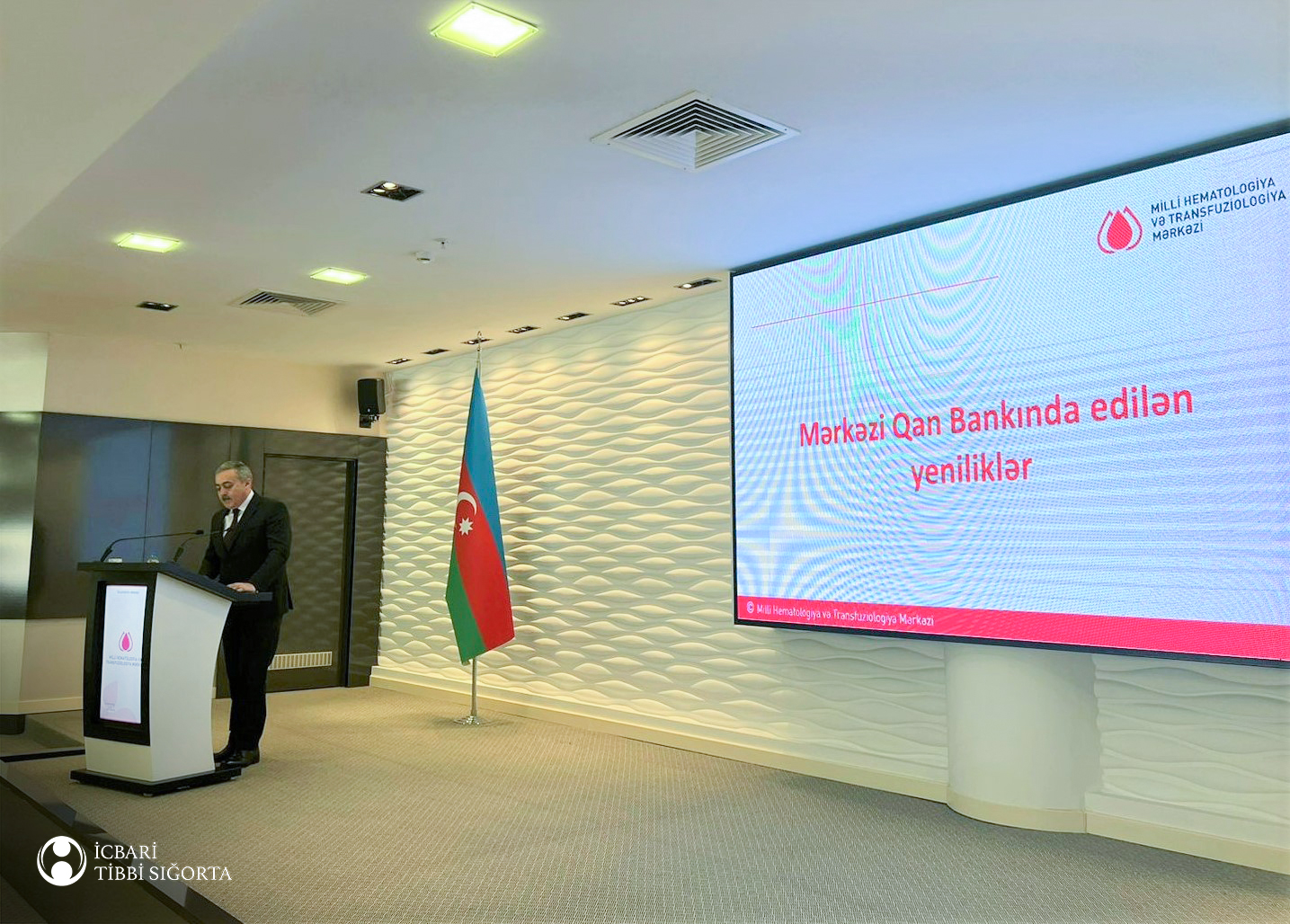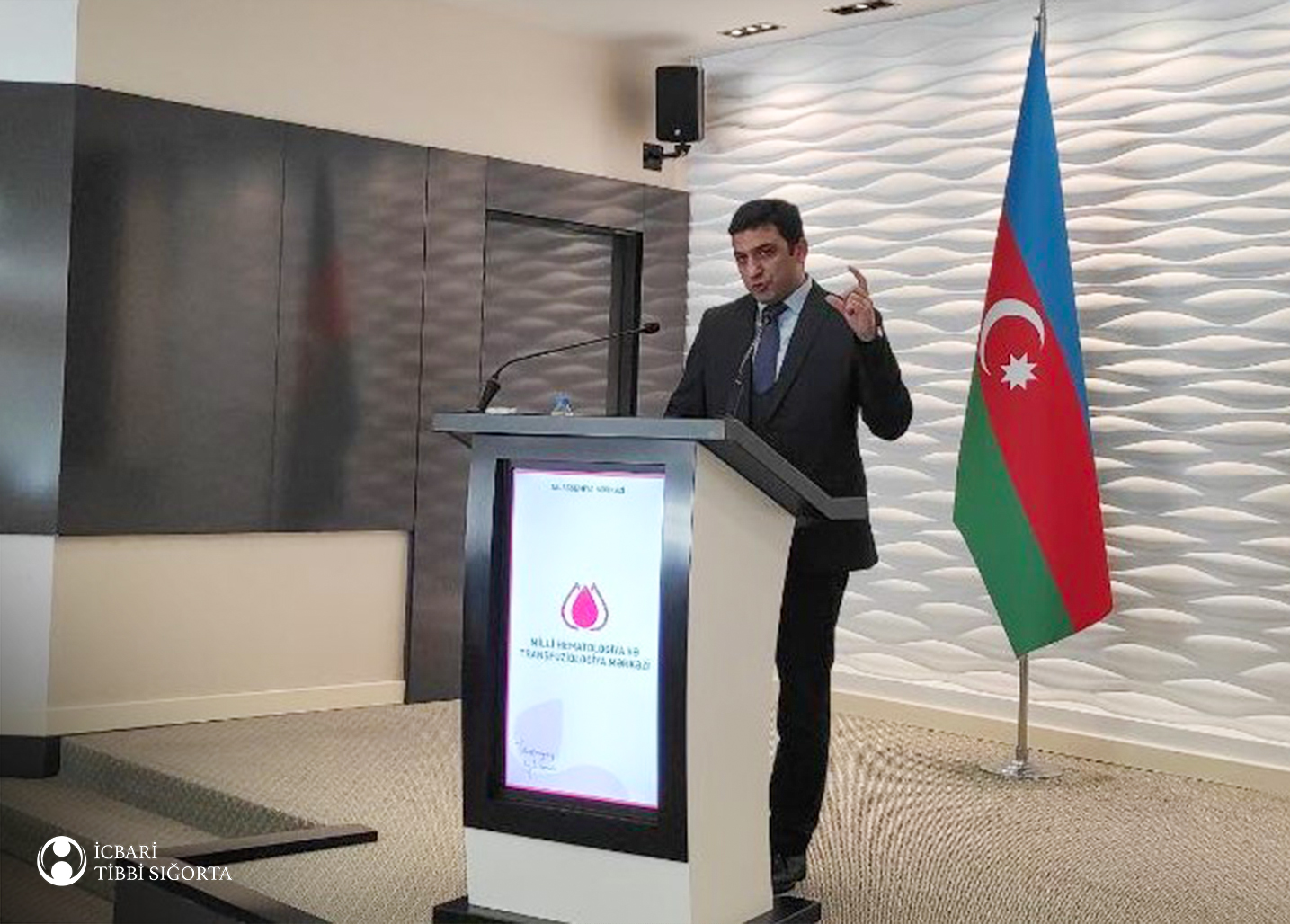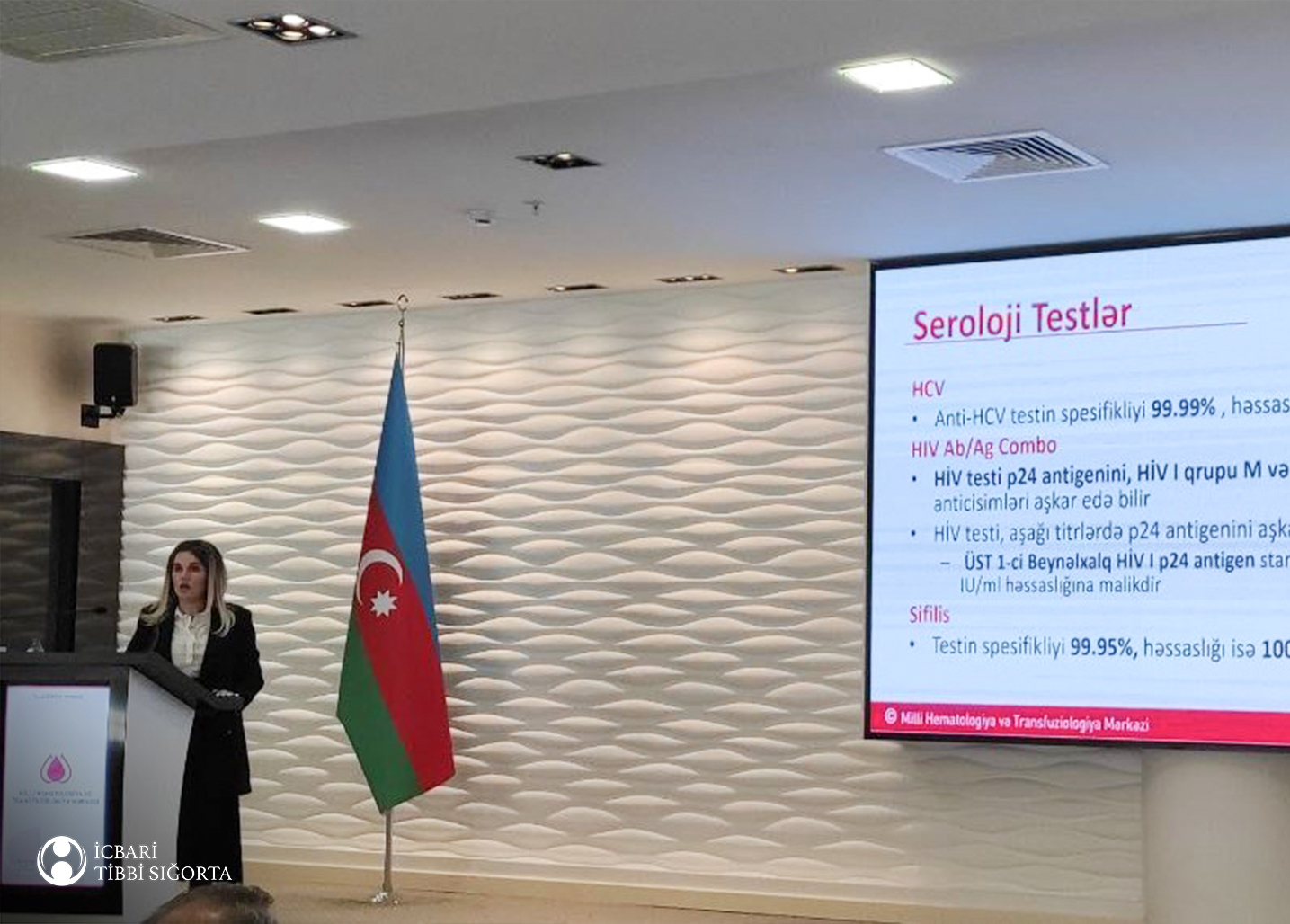14 Dekabr 2022 15:27
İcbari Tibbi Sığorta üzrə Dövlət Agentliyi Mərkəzi Qan Bankında bir sıra yeniliklər tətbiq edib
İcbari Tibbi Sığorta üzrə Dövlət Agentliyi (Agentlik) tərəfindən əhaliyə göstərilən transfuzioloji xidmətlərin və qan tədarükünün müasir standartlara uyğunlaşdırılması istiqamətində bir sıra yeniliklərin tətbiqinə başlanılıb.
Mərkəzi Qan Bankında tətbiq edilən yeniliklərlə bağlı Milli Hematologiya və Transfuziologiya Mərkəzində tədbir keçirilib. Tədbiri giriş sözü ilə açan İcbari Tibbi Sığorta üzrə Dövlət Agentliyinin Tibbi Planlama departamentinin rəhbəri Hikmət İbrahimli Mərkəzi Qan Bankının maddi-texniki bazasının möhkəmləndirilməsini dövlətimiz tərəfindən vətəndaşlarımıza göstərilən xüsusi qayğının və diqqətin təzahürü olduğunu bildirib. H. İbrahimli qan və qan komponentlərinin talassemiya, hemofiliya, leykoz xəstəliyindən əziyyət çəkən insanların sağlamlığının təmin edilməsində əvəzedilməz müalicə vasitəsi olduğunu qeyd edib. O vurğulayıb ki, bu sahənin inkişafı qan ehtiyacı olan digər xəstələrin tələbatının ödənilməsi baxımından həyati əhəmiyyət daşıyır.
Tədbirdə həmçinin Tibbi Ərazi Bölmələrini İdarəetmə Birliyinin (TƏBİB) Tibbi fəaliyyətin təşkili departamentinin rəhbəri Teymur Mirzəbəyli, Mərkəzi Qan Bankının rəhbəri Qumral Vəliyeva çıxış edərək Mərkəzi Qan Bankında tətbiq edilən yeniliklər barədə məlumat veriblər. Çıxış edənlər bildiriblər ki, bu sahədə maddi-texniki bazanın yaxşılaşdırılması insanların keyfiyyətli qan və qan komponentləri ilə təmin olunması və əhaliyə göstərilən transfuzioloji yardımın təkmilləşdirilməsinə xidmət edəcək. Bu yeniliklər eyni zamanda vətəndaşlarımızın icbari tibbi sığorta çərçivəsində keyfiyyətli tibbi xidmətlərdən faydalanmasına şərait yaradacaq.
Qeyd olunub ki, cari ilin 1 sentyabr tarixindən etibarən Mərkəzi Qan Bankında ilk dəfə olaraq qanın transmissiv infeksiyalara (Hepatit B və C, insanın immunçatışmazlığı virusu, sifilis) seroloji müayinələri üçün 2 ədəd tam avtomatlaşdırılmış Abbott Alinity-s analizator cihazı quraşdırılaraq istifadəyə verilib. Yeni cihazlar yarımavtomat cihazlardan daha yüksək spesifikliyə və həssaslığa malikdir.
Bundan əlavə, Agentlik tərəfindən alınmış 2 ədəd tam avtomatlaşdırılmış Abbott Architect i-2000SR analizator cihazının seroloji müayinələrin aparılması üçün Mərkəzi Qan Bankının Gəncə və Lənkəran şəhərlərindəki bölmələrində quraşdırılması nəzərdə tutulub. Mərkəzləşdirilmiş laboratoriya sisteminin qurulması nəticəsində Mərkəzi Qan Bankının Mingəçevir, Bərdə və Şəki bölmələrində donorlardan götürülən qan nümunələri Gəncə şəhərinə, Quba, Sumqayıt və Şirvan bölmələrindən isə Bakı şəhərinə göndəriləcək. Lənkəran bölməsi tərəfindən götürülən qan nümunələri isə Lənkəran şəhərində quraşdırılmış cihazda müayinə ediləcək.
Paytaxtda və regionlarda tam avtomatlaşdırılmış cihazların quraşdırılması müalicə-profilaktika müəssisələrinin keyfiyyətli və təhlükəsiz qan komponentləri ilə təmin olunmasına xidmət edir.
Mərkəzi Qan Bankında tətbiq edilən digər əhəmiyyətli yenilik isə inkişaf etmiş ölkələrdə olduğu kimi leykofiltrli qan torbaların istifadəsinə keçidlə bağlıdır. Sözügedən yeniliyin tətbiqinə burada cari ilin iyun ayından başlanılıb. Öncə istifadə olunan filtrsiz qan torbalarından fərqli olaraq leykofiltrli qan torbaları qan komponentinin hazırlanma mərhələsində filtrasiya edilməsinə imkan yaradır. Leykofiltrsiz torbalarda qan depoda saxlanılan zaman leykositlərdən bəzi maddələr (sitokinlər və s.) ifraz olunur. Bu isə xəstələrdə qan komponentinə qarşı reaksiyalara səbəb olur. Lakin leykofiltirli qan torbalarında qan dərhal filtrasiya olunduğu üçün bu maddələr ifraz olunmur və qan komponenti köçürüldükdən sonra reaksiya vermə ehtimalı azalır.
Tədbirin sonunda “Abbott” şirkətinin nümayəndələri Onur Minare və Rina Zaxariya “Qan bankları və plazma mərkəzlərində qlobal trendlər və prioritetlər”, "Qan bankı həlləri, donorların cəlb olunması və maarifləndirmə proqramlarında innovasiyalar” mövzularında təqdimatlarla çıxış ediblər.
Xəbərlər
İcbari tibbi sığorta ilə 182 000-dən artıq doğuş aparılıb
16 İyul 2024 11:10
Diz oynağının endoprotezləşməsində İsveçrə istehsalı protezlərdən istifadə olunur
12 İyul 2024 10:42
Kəskin orta otitin cərrahi müalicəsi icbari tibbi sığorta ilə qarşılanır
09 İyul 2024 11:11
Tiroidektomiya əməliyyatı icbari tibbi sığorta ilə ödənişsizdir
05 İyul 2024 10:25
İcbari tibbi sığorta ilə qasıq yırtığı açıq və laparoskopik üsulla bərpa olunur
01 İyul 2024 15:18
İcbari Tibbi Sığorta üzrə Dövlət Agentliyinin nümayəndə heyəti Yaponiyaya işgüzar səfər edib
28 İyun 2024 10:51
İcbari tibbi sığorta ilə 540 splenektomiya əməliyyatı icra olunub
24 İyun 2024 14:52
Zaur Əliyev Goranboy şəhərində vətəndaşları qəbul edib
21 İyun 2024 17:00
İcbari tibbi sığorta uşaqlığın çıxarılması əməliyyatını qarşılayır
21 İyun 2024 10:57
Agentlik, TƏBİB və Ankara Universiteti üçtərəfli anlaşma memorandumu imzaladı
14 İyun 2024 14:49













